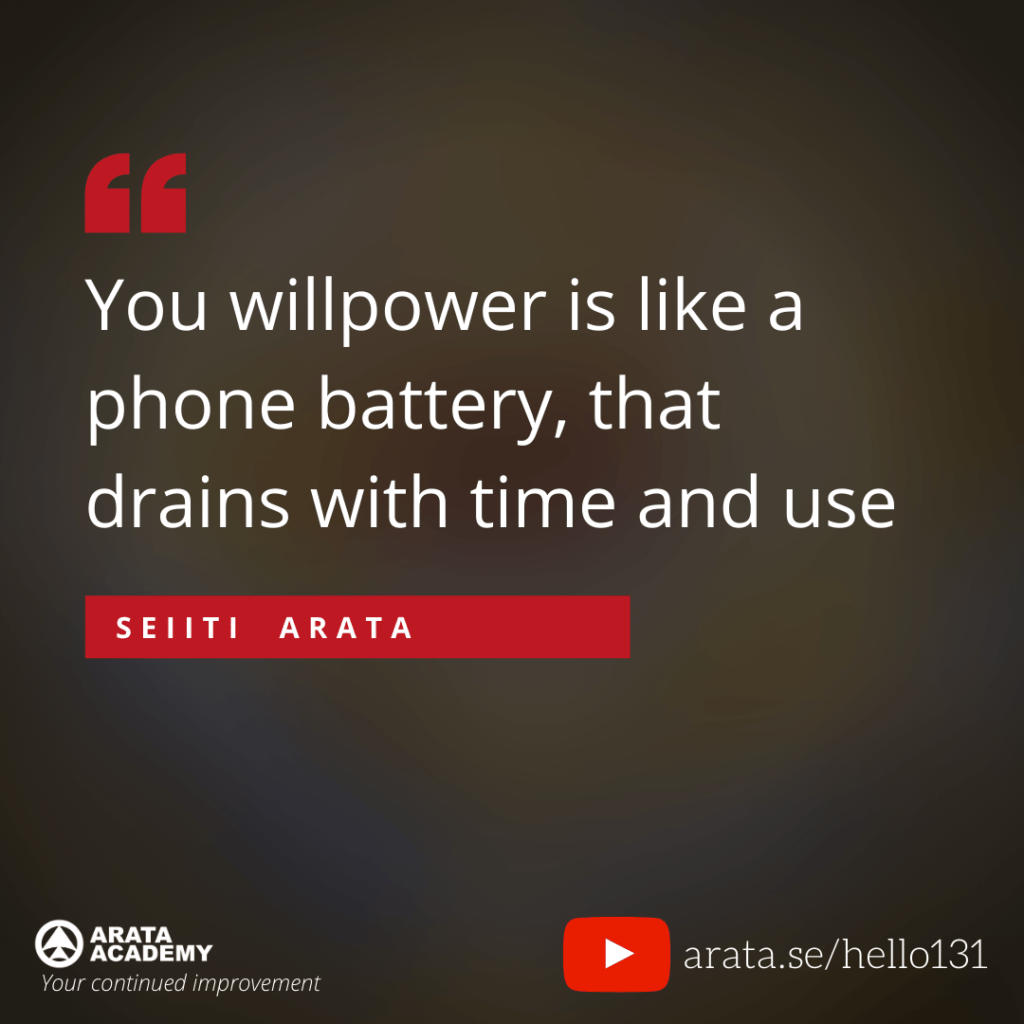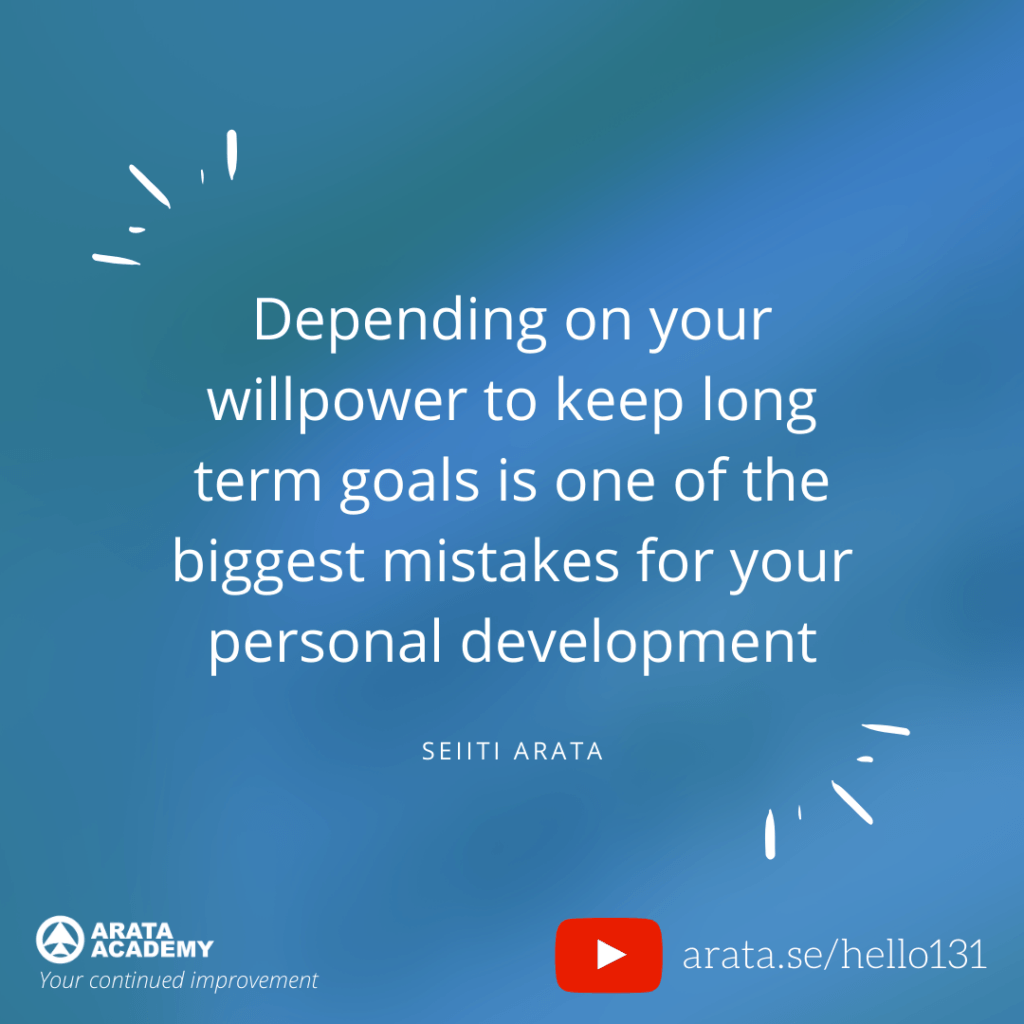Hello! Seiiti Arata. What is it that we truly mean when we say we are suffering from a lack of willpower? Laziness, lack of discipline, or a lack of time are things we use to describe something that’s already been studied by science: the problem of letting willpower run out.
I’m going to explain to you how this psychological phenomenon works. I’ll share three important discoveries from scientific studies that examine the nature and the characteristics of willpower.
This is important because a lack of willpower is a problem when we want to change something in our lives. For example, plans to get in shape, learn another language or read more books.
When we create these plans, we’re full of willpower and we can start the first stages.
The problem is that time passes, and that initial excitement begins to fade away until everything seems to go back to how it was before. That is, it’s not worth promoting a life change that depends exclusively on willpower.
A study completed by the American Psychological Association discovered that the biggest difficulty for achieving a lifestyle change is actually a lack of willpower.
It’s a mistake to depend on your willpower
How many of you have started a diet on a Monday, full of grandiose intentions, just to see motivation dropping throughout the week? How many of you have ever made spectacular plans to study more, only to return to old habits over time?

I promised you three scientific discoveries about the properties of willpower. So here is the first scientific breakthrough that will help you to improve your understanding of this subject: willpower can run out.
One of the first scientific studies on the subject placed participants in a room with a table and two plates on it. On one of the plates, there were some radishes. On the other were warm cookies, fresh from the oven.
The scientists asked some people to only just the cookies. Other people were asked to only eat the radishes. After this, they had 30 minutes to solve a complicated brain teaser.
The conclusion was remarkable. Those who were only allowed to eat the radishes had to exercise willpower in order to resist the nice smelling cookies. On average, those who ate the radishes gave up on the brain teaser after just eight minutes. Those who were allowed to eat the cookies had an advantage: the biscuit eaters didn’t waste their willpower resisting the urge to eat. Because of this, they continued trying to solve the brainteaser for nineteen minutes, more than double the time of the first group!
Since the publication of this study, various other experiments have confirmed the theory now known as Willpower Depletion. The simplest way to understand this theory is to think of willpower like the battery of your phone. As you use willpower, it runs out, only returning to normal after being recharged.
Willpower is dependant upon your beliefs and attitudes
Willpower is the ability to delay gratification, resisting short term temptations to be able to achieve long term goals.
This resistance ability is the ability to maintain a conscious and planned behaviour pattern instead of simply reacting impulsively to events.
Up until now, you’ve already learned, alongside the scientists, that willpower is a limited resource.
The second lesson is discovering what exactly makes us use up our willpower.
The first theory was that willpower was used up during the day because of physical tiredness. This hypothesis was discarded.
There was no significant difference in willpower between people who stayed up all night without sleeping and people who had enjoyed a good night’s sleep. But be aware that this is not necessarily showing you the whole picture. I recorded a special class with six activities in order to strengthen your willpower and we’ll also have a specific rest-activity that will help you. Stay here until the end where I explain how to gain access to the special class including these six activities.

The second theory was that willpower can be strengthened or weakened depending on our beliefs and attitudes. It was discovered that those who are always trying to please others use up too much willpower. When you think too much about what others want, you spread your focus. To increase willpower it’s better to stay focused on your own goals and complete your own objectives.
Something else that helps the potential of willpower is being in a good mood. If you get an unexpected present or watch a comedy film, you enter a good mood state. This good mood can help strengthen you, helping you do what needs to be done.
This leads us on to the third discovery, the one that is the most interesting and valuable of them all: willpower can be trained as if it were a muscle.
Willpower can be trained as if it were a muscle
After so many experiments, what surfaced was the theory that willpower can be strengthened by way of mental exercises, just like a muscle can be strengthened by physical exercises.
To prove the theory that willpower can be trained, volunteers were placed on a diet for two weeks and told they had to carry out some self-control exercises. These volunteers were compared to a control group who didn’t do the exercises. What was the result? The volunteers that passed the diet and exercised self-control ended up becoming more disciplined. They were able to transform into an improved version of themselves to overcome willpower depletion.

A similar test was done with people who smoke cigarettes. A group of smokers had to exercise self-control for two weeks, avoiding sweets. What was the result? The smokers that trained their self-control avoiding sweets were also much more successful when trying to stop smoking. This became clear when compared to other smokers who didn’t have to practice self-control by avoiding sweets.
So, if you’re someone that complains about a lack of discipline or a lack of willpower, the solution is simple. What you need to do now is complete six purposeful activities to strengthen your willpower. What I’m going to do is introduce you to a special class with the six activities.
Imagine that you had much more willpower than the average person. Do you think you’d be able to achieve your goals more easily, such as losing weight, learning another language, reading more books or anything else you can think of?
You’ve just learned about three important discoveries that have been made in the field of human behaviour: first, willpower is indeed a limited resource. Second, our willpower fluctuates depending on our mentality and our choices. And, third, willpower can be trained through specific exercises.
There are six simple, hands-on exercises for you to train your willpower. In order to have more willpower, you need to 1) have a specific exercise routine, 2) avoid un-achievable plans, 3) prioritise what’s important, 4) find strategic ways to restore your vitality, 5) know how to manage stress and 6) strategically choose the number of choices to make. I teach these six exercises in detail in a special class in our Personal Development course.
The good news for you who’s interested in having more willpower is that I’ve decided to open this class for free to teach the six practical exercises for you to train your willpower. To access this class with the six activities, all you need to do is visit https://arata.se/willpowerpractice

